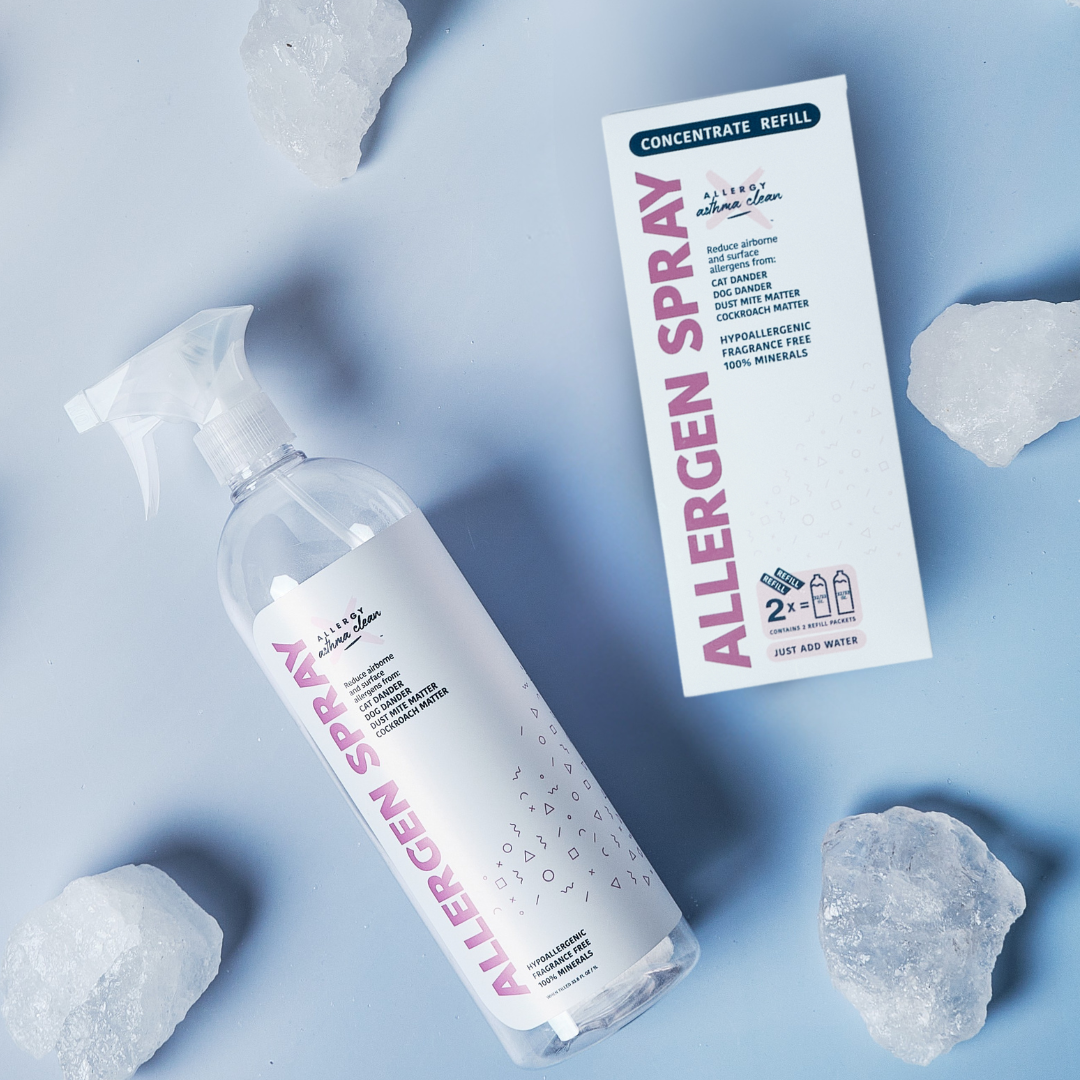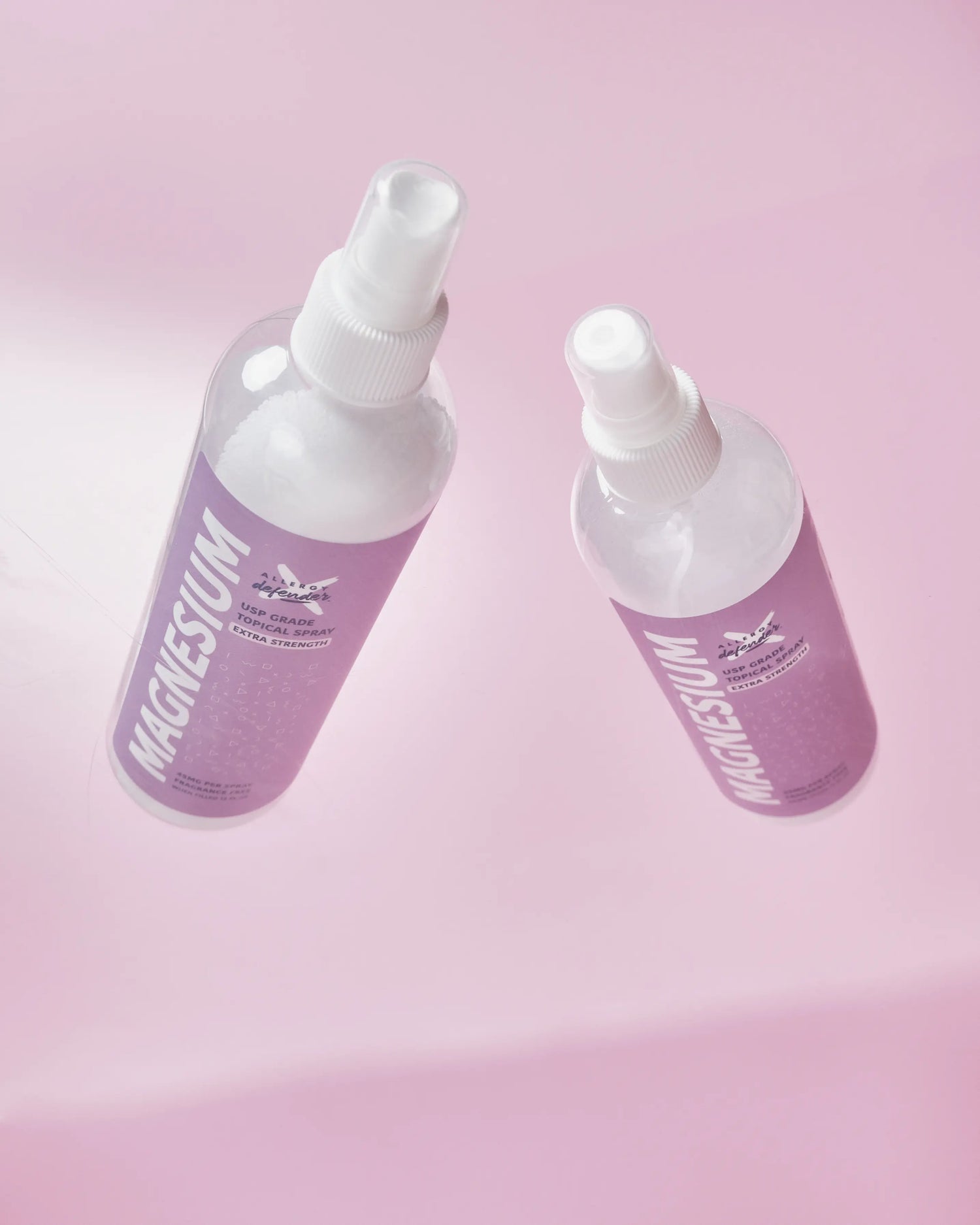Indoor allergens shouldn't control your life.
Take this SHORT QUIZ* to learn more about your symptoms.
Plus, there's a new, natural way to control allergens, backed by science.

-
Dust Mite Bites?
The term "dust mite bites" is misleading. In reality, dust mites do not bite humans. They lack the physical ability to do so.
-
Dust Mite In Bed
Dust mites are tiny, microscopic creatures that thrive in warm, humid environments, particularly in beds where they feed on dead skin cells shed by humans.

Pet dander
Cats & Dogs
The major cat allergen (Fel d 1) and dog allergen (Can f 1) are proteins present in your pet's dander, saliva, and urine. Pro tip: Pet hair is not an allergen but it can collect other allergens like pollens and mold.
Pet allergens are extremely small - so small that it can easily become airborne and inhaled. The average size of a pet dander particle is just 2.5 microns, which is about one-tenth the diameter of a human hair.
Because pet allergens are so tiny, it can easily pass through HVAC filters, or air purifiers and into your lungs.
Once they become airborne, pet allergen particles can remain afloat for hours, making them a common trigger for indoor allergies. This can trigger asthma attacks and other respiratory problems. What's more, pet allergens are extremely light and can easily be carried on clothes or shoes, which means it can spread quickly from one room to another. Indeed, your home can contain pet allergens even if you don't own a pet.


Think you might have indoor allergies? Take this short quiz.*

Cockroach
Cockroach (bla g 2) allergen is a protein that is found in cockroach droppings, saliva, and body parts. When these proteins become airborne, they can trigger an allergic reaction in people who are sensitized to them. Symptoms of a cockroach allergen reaction include sneezing, runny nose, watery eyes, and itching. In severe cases, cockroach allergen can cause asthma attacks and other respiratory problems.
How the body reacts to an allergen
Allergies are a complex immune response in which the body senses an otherwise harmless substance as a threat. When an allergen is encountered, the immune system responds by releasing histamines and other chemicals into the bloodstream, causing symptoms such as sneezing, wheezing, or hives. These reactions are intended to help eliminate the perceived threat from the body, but they can also cause serious health problems and discomfort for those who suffer from allergies. Ultimately, understanding how allergies work is critical for anyone who wants to live a healthy and comfortable life despite their allergic sensitivities.
Your mucous membranes and allergens
Mucous membranes are found throughout the body, lining various cavities and covering surfaces that come into contact with the external environment. One of their primary functions is to act as a barrier against harmful substances, such as bacteria and viruses. However, mucous membranes can also become irritated or inflamed in response to allergens, or pet allergens. When this happens, mucous membranes produce excess mucus in an attempt to flush out the allergen. This can lead to symptoms such as runny nose, watery eyes, and sneezing. In severe cases, mucous membrane inflammation can cause difficulty breathing.
What about high concentrations of allergens
Side effects of concentrated amounts of indoor allergens can be serious and should not be taken lightly. Exposure to high concentrations of indoor allergens, such as dander, may lead to a variety of adverse reactions in some individuals. In some cases, prolonged exposure to indoor allergens may even contribute to the development of chronic health conditions such as asthma. In severe cases, an animal allergy can even trigger anaphylaxis, a potentially life-threatening reaction. Therefore, it is important for people with sensitivities to these substances to take steps to minimize their exposure whenever possible.

What can you do to help prevent an allergy attack?
First, it's important to see an allergist/immunologist. They will help you narrow down what you are allergic to and how best to treat your symptoms. Here are some steps you can take to help reduce an attack.
Pet allergies:
1. Try not to hug or kiss your pet (I know, it's nearly impossible) without washing your hands and face after
2. Invest in a good HEPA air filter with a high MERV rating
3. Keep pets out of the bedroom; remember allergens are sticky proteins, and they will stick to your bedding, clothes, furniture, etc
4. Get a micro-filter for your vacuum. You would be surprised at how many allergens leak back into the air from vacuuming. Pro tip: Use the Allergen Spray in the air after vacuuming
5. Use Allergen Spray throughout your house in the air and on surfaces. Since allergens can easily transfer from room to room, it's vital to spray your entire house.
Dust mites allergies
1. Change your bedding often. Always wash your bedding in hot water (130 degrees) with soap.
2. Invest in a good HEPA air filter or air purifier
3. Buy a good set of allergy-proof sheets and pillowcases.
4. On items you can't wash, use an Allergen Spray.
Cockroach allergy
1. Avoid leaving pet food out
2. Clean often. Use the Allergen Spray after cleaning
3. Fix any leaks
4. Use bait if needed. Do not use a spray.
Frequently Asked Questions
Are dust mites in every home? You can find detectible levels of dust mites in just about every home.
Do dust mites bite? No, they do not bite humans.
What if I wash my bedding in cold water? We recommend washing all items in hot water around 135-140 degrees.
Do allergens affect indoor air quality? Yes!
Do dust mites trigger an asthma attack? If you have asthma and a dust mite allergy, you should take precautions. Additionally, dust mites can cause indoor air quality issues for those who have asthma but do not have a dust mite allergy.
What options are available besides shots and medication? There are several options, including immunotherapy and allergen sprays, but it is best to talk with your doctor about your particular allergy and course of treatment.
How can I find an effective allergen spray? Look for lab-verified allergen sprays, preferably third-party verified. This means an outside party has tested the product and confirmed that it works to reduce allergens. Also, look for one that doesn't contain harsh chemicals or scents that could add to your allergy burden. Finally, choose one that discloses their ingredients.
Glossary of dust mite terms
Allergens: An allergen is any substance that can trigger a negative reaction in someone who is allergic.
Allergic Reaction: When your body comes into contact with something you're allergic to, it can cause an allergic reaction. Symptoms of an allergic reaction can range from mild (a rash or itch) to severe (trouble breathing). In some cases, an allergic reaction can even be life-threatening.
Allergen Spray: A spray that can help control pet allergens in your home.
Dust mites: Dust mites are small, spider-like creatures that live in soft surfaces.
Pet dander: Pet dander is a fine, often microscopic, particle that is shed from the body of a pet.
Disclaimer: Always talk to your doctor before starting or stopping any medications.
What type of flooring and furniture should I have to minimize allergens?
To minimize allergens in your home, it is recommended to choose flooring and furniture options carefully. When it comes to flooring, consider opting for hard surfaces such as hardwood, laminate, or tile. These types of flooring are easier to clean and less likely to trap dust mites and other allergens compared to wall-to-wall carpets. If you prefer the warmth and comfort of carpets, go for low-pile carpets that can be regularly vacuumed and washed to remove any allergens that may accumulate.
In addition to flooring, choosing the right furniture can also help minimize allergens. Avoid heavy drapes and overstuffed fabric furniture, as these can trap dust and allergens. Instead, opt for furniture with smooth, easy-to-clean surfaces such as leather or vinyl, which can be wiped down regularly to remove any dust or allergens. If you do have fabric furniture, consider using removable, washable slipcovers that can be laundered frequently to keep them free of allergens.
By opting for hard-surface flooring and furniture with smooth, easy-to-clean surfaces, you can create an environment that is less likely to harbor allergens and dust mites. Regular cleaning and maintenance of these surfaces will further help in keeping allergens at bay, creating a healthier and more allergy-friendly home.
What are the main sources of indoor allergens?
The main sources of indoor allergens can be attributed to various factors within your home environment. These include:
1. Pets: Dander and saliva from pets, such as cats or dogs, can contain allergens that can trigger allergic reactions in susceptible individuals.
2. Wall-to-wall carpet: Carpets can accumulate dust mites, pet dander, pollen, and other allergens, making them a potential source of indoor allergies.
3. Soft furniture: Upholstered furniture like couches and armchairs can harbor dust mites, pet dander, and mold spores, which contribute to indoor allergens.
4. Stuffed toys: These toys, especially if not regularly cleaned, can collect dust mites, pollen, and pet dander, becoming a hidden trigger for allergies.
5. Bedding: Pillows, mattresses, and bedding materials that are not washed or protected against allergens like dust mites can be a significant source of indoor allergens.
6. Damp areas: Areas in your home with high humidity levels, such as bathrooms or basements, are prone to mold growth, which releases mold spores into the air, potentially causing allergic reactions.
7. Indoor plants: While houseplants can provide aesthetic appeal, they can also release pollen or mold spores, acting as potential triggers for indoor allergies.
8. Mattresses without allergy covers: Without protective covers, mattresses can accumulate dust mites, which are a common indoor allergen.
9. Pillows and bedding that cannot be washed in hot water: Items that cannot be washed at higher temperatures may not effectively remove allergens like dust mites or pollen.
It is worth noting that allergens can be present on surfaces and become easily airborne when disturbed, such as during dusting or sitting on furniture. Therefore, regular cleaning and reducing allergens in your home are crucial steps in controlling indoor allergies.
Is it possible to control indoor allergens?
Controlling indoor allergens is indeed possible through various cleaning and preventive measures within your home. Numerous sources contribute to indoor allergens, such as pets, wall-to-wall carpet, soft furniture, stuffed toys, bedding, damp areas, indoor plants, mattresses lacking allergy covers, and unwashable pillows and bedding. Notably, it is worth mentioning that there may be a higher concentration of allergens on surfaces rather than in the air. These surface allergens can easily be released into the air when disturbed, such as during dusting or sitting. Therefore, by implementing regular Allergen Spray use and minimizing allergen sources, you can effectively manage indoor allergens and create a healthier living environment.
What are the sizes of allergens and how are they measured?
Allergens, which are substances capable of inducing allergic reactions and asthma symptoms in certain individuals, exhibit a range of sizes that are assessed in microns and kilodalton.
















